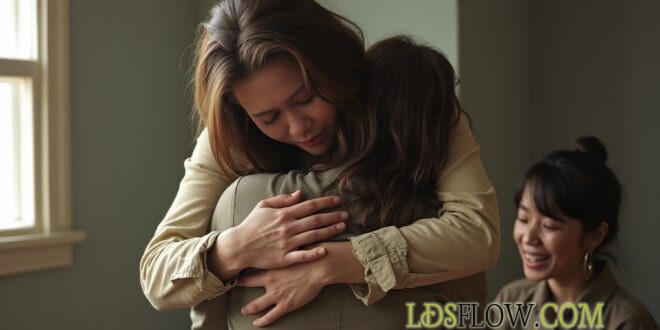Healing through faith journey stories have the power to inspire and transform. In this article, we explore one woman’s remarkable healing through faith journey—from a life marked by poverty and abuse to a place of respect, dignity, and love within the Church of Jesus Christ of Latter-day Saints.
In a powerful testament to the transformative power of faith, a woman’s journey from a life of poverty and abuse to one of respect and healing has come to light. Growing up in an environment where she faced constant sexualization and mistreatment, even from a young age, her life took a remarkable turn upon joining the Church of Jesus Christ of Latter-day Saints.
For the first time, she encountered men who treated her with genuine respect and dignity. This stark contrast to her past experiences initiated a profound healing process, challenging prevailing narratives about gender dynamics within religious communities.
This account offers a unique perspective on the often-debated topic of gender relations in religious settings. It suggests that sweeping generalizations about misogyny in religious institutions may overlook the positive, life-changing experiences of individuals like this convert.
Her story serves as a reminder of the complex nature of human interactions and the potential for faith communities to provide safe havens for those seeking respect and personal growth.
One of the first things that drew my interest in the church was that not a single missionary made any attempt to engage with me on a sexual level. Attending church was my first experience where trustworthy males were the norm. It was an earth-shattering revelation to me that you could have a culture where men act like that consistently. All the adult males in the church treated me like a daughter — a cherished one — something that my own father had failed to do.
And these experiences continued when I enrolled at Brigham Young University, where I was never once pressured for sex in five years of dating male 20-somethings. In those years of both casual dates and multiple long-term relationships, I was never once struck, called a name, whistled at, groped or complimented on one of my body parts. I went on to work as a secretary for the church’s Family History Department, where men would regularly open doors for me, chide each other for not showing me enough deference, display obvious biases toward my opinions and desires and try to set me up with their sons.
When I finally left Utah, it was with an elevated sense of inherent value that nothing in my childhood would suggest was possible. This is the principal point I wish to make. My childhood left me shot through with fear and shame — innumerable layers of it. I may not recover from all of it in this life. However, the healing and the real happiness I’ve experienced so far is nothing short of miraculous. And it is largely because of my association with the church, and the love bestowed on me by the good and faithful men in it.
Contrary to popular perception, men in leadership capacities in my faith are not “bosses,” but brothers and fathers, which I desperately needed. I don’t know why or how, but I know that I needed to feel this kind of love, particularly from men, who became conduits for God’s own pure and rationally unaccountable love that put my shame to shame.
This account provides a poignant contrast to the often-heard criticisms of the Church. It highlights the transformative power of faith communities in addressing real-world issues that many face daily.
The author’s words are particularly striking: “As a young girl, I grew up surrounded by poverty (at times extreme), physical violence and drugs. I don’t mean the psychological trauma of sitting through an uncomfortable discussion about the law of chastity. I mean the kind where someone chokes you after you complain that their pornographic video is keeping you awake on a school night.”
Such testimonies underscore the potential of faith-based organizations to offer support, healing, and a path forward for those facing severe adversity. They remind us of the importance of maintaining perspective when discussing the challenges and benefits of religious communities.




